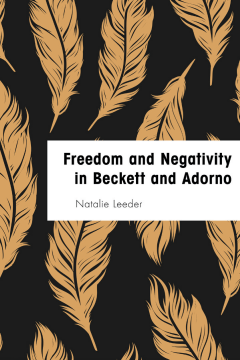
Additional Information
Book Details
Abstract
Since his notorious 1961 lecture, 'Trying to Understand Endgame', Theodor W. Adorno's name has been frequently coupled with that of Samuel Beckett. This book offers a radical reappraisal of the intellectual affinities between these two figures, whose paths crossed all too fleetingly. Specifically the book argues for a preoccupation with the concept of freedom in Beckett's works - one which situates him as a profoundly radical and even political writer. Adorno's own more explicit reconceptualization of freedom and its scarcity in modernity offers a unique lens through which to examine the way Beckett's works preserve a minimal space of freedom that acts in opposition to an unfree social totality. While acknowledging both the biographical encounters between Adorno and Beckett and the influence Beckett's writings had on Adorno's aesthetics, Natalie Leeder goes further to establish a dialogue between their intellectual positions, working with a range of texts from both writers and seeking insight in Adorno's less familiar works, as well as his magnum opera, Aesthetic Theory and Negative Dialectics.
It is rare to read a work that is so conceptually careful and critically poised, and the question of freedom and its relationship to negativity explored here could hardly be more politically urgent. To be taken back to Beckett and Adorno by this beautifully-written book is to be exposed to resources that might help us to think through both the intellectual landscape of the recent past and the crucial problems we face in our difficult present.
Laura Salisbury, Associate Professor in Medicine and English Literature, University of Exeter
Here Natalie Leeder hands two original gifts to scholarship: she focuses Adorno’s prismatic thought with clear and bright acuity; and she shines this insight into the darkest corners of Beckett’s writing. Adorno and Beckett both develop negative critiques of unfreedom that unpick philosophical tradition and that reimagine the limits of metaphysics, technology, and aesthetics. This superb book must be read.
James McNaughton, Associate Professor, University of Alabama
Natalie Leeder completed her PhD at Royal Holloway, University of London.
Natalie Leeder’s book stands out through its philosophical sophistication and literary sensitivity. It offers, via the dialogue it creates between Adorno’s philosophical and Beckett’s literary work, an exemplary model of how philosophy and literature can interact to illuminate central issues in the modern world.
Andrew Bowie, Professor of Philosophy, Royal Holloway, University of London
In a spiritedly polemical and very engaging manner, Leader takes the much discussed but often superficially understood relationship between Theodor Adorno and Samuel Beckett and uses it to redefine current perceptions of Beckett as a political author. Leader’s knowledge of the German philosophical tradition goes hand in hand with her sensitive attention to the details of Beckett’s lesser-known work – from Eleutheria to the late prose, TV and radio plays. Rigorous and witty, Freedom and Negativity lets Adorno shine in all his compelling complexity while offering exciting new ways into Beckett’s aesthetics.
Daniela Caselli, Senior Lecturer, The University of Manchester, and President of the Samuel Beckett Society
Table of Contents
| Section Title | Page | Action | Price |
|---|---|---|---|
| Cover | Cover 1 | ||
| Half Title | i | ||
| Series Information | ii | ||
| Title Page | iii | ||
| Copyright Page | iv | ||
| Contents | v | ||
| Acknowledgements | vii | ||
| Abbreviations | ix | ||
| Introduction | xiii | ||
| The Antinomies of Freedom | xviii | ||
| Adorno’s Beckett | xxxii | ||
| Notes | xxxviii | ||
| Chapter One Freedom and Its Limits | 1 | ||
| Murphy’s Metacritique of Philosophy | 3 | ||
| Eleuthromania | 10 | ||
| Failing Better | 17 | ||
| Notes | 21 | ||
| Chapter Two The Illusion of Freedom and the Freedom of Illusion | 25 | ||
| The Crisis of Schein | 28 | ||
| Ironic Figures in the Novellas | 40 | ||
| Notes | 50 | ||
| Chapter Three The Scars of Evil | 55 | ||
| Evil and Society | 59 | ||
| Endgame and Universal History | 72 | ||
| Notes | 84 | ||
| Chapter Four Virtual Freedom | 89 | ||
| The Natural Subject | 91 | ||
| Film’s Imageless Images | 101 | ||
| Interiors and Iconicity | 110 | ||
| Notes | 121 | ||
| Chapter Five Metaphysics | 129 | ||
| Imagining Immanence | 132 | ||
| Metaphysical Experience | 143 | ||
| Coda: Enough? | 152 | ||
| Notes | 155 | ||
| Epilogue | 161 | ||
| Where is the Proletariat? | 163 | ||
| Beyond the Block | 165 | ||
| Negativity | 167 | ||
| Notes | 168 | ||
| Bibliography | 169 | ||
| Primary Sources | 169 | ||
| Secondary Sources | 171 | ||
| Index | 187 |
